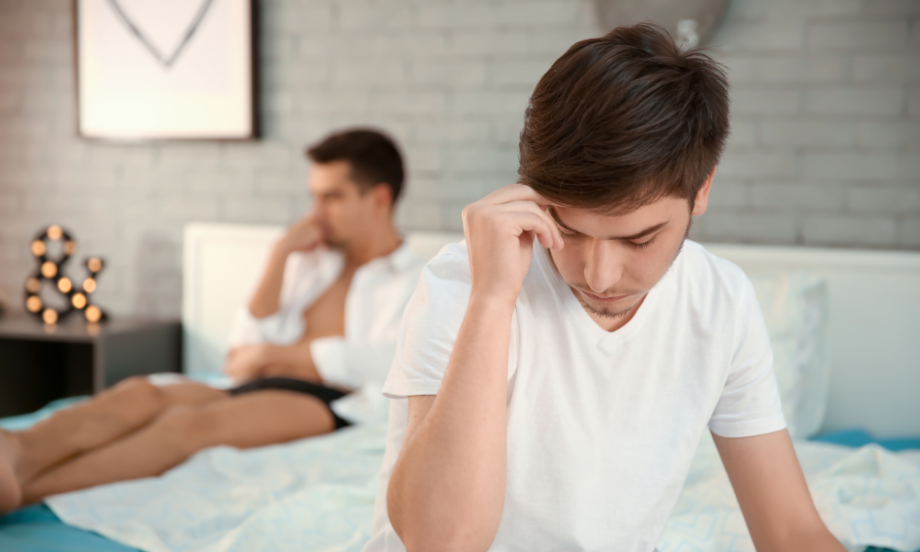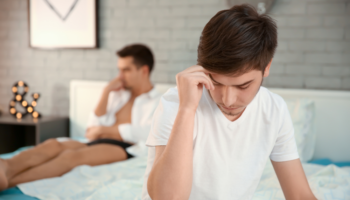Have you ever heard a story like this: We have a couple where one partner is interested in sex all the time, the other, not so much. They head to counseling, they read articles, and they employ all manner of interventions — often aimed at “fixing” one partner’s “low” libido — to get on the same sexual page.
Sex becomes a sore spot, a hot-button issue, a less-than-happy topic in this relationship. Then that relationship ends, the “low libido” partner moves on to meet someone new, and suddenly they don’t seem to have a troublesome low libido anymore… What the heck happened?
What happened is actually quite common. It happens when we misunderstand how desire works and don’t pay attention to what’s going on in our relationships. That’s why today, we’re going to talk a bit about this big question: Is the problem your libido or your relationship?
What Is Libido?
First things first, what is libido? Simply put, it’s our desire to engage sexually. This can vary wildly between people, and it can be very different for each person based on the different circumstances at various points in their lives. It’s a deeply misunderstood part of our sexuality, and we’re going to do some work to clarify some of those misunderstandings right now.
Libido is often referred to as “sex drive,” and that can get complicated for a couple of reasons:
The assumption is that libido is an inherent drive people have, like the drive to eat or consume water. It’s not.
While people get up in arms upon hearing this, human beings do not need to have sex for survival — propagation of the species, yes. It’s needed for that, but let’s be honest, most of us are not out there day-to-day coping with an inherent urge to keep humanity alive via our sex lives. Our level of desire is not an inherent, built-in, survival-based thing.
The vision of an inherent “drive” feeds the idea that it works the same for everyone.
That sex is good, and thus wanting it is correct, and wanting it often is right, and people who don’t fit that description are lacking. Let us not forget that asexual people exist, but also, there are different ways to experience desire. Let’s take a minute to break that down.
How Libido Works
No modern conversation about libido would be complete without citing the work of Emily Nagoski, Ph.D. An educator, researcher, and the author of Come As You Are: The Surprising New Science That Will Transform Your Sex Life and Come Together: The Science (and Art!) of Creating Lasting Sexual Connections, Nagoski’s work plays a huge role in how we now understand and talk about libido. If you enjoy this article and want to learn more about these concepts, do yourself (and your partner) a favor and read her books.
In her book Come As You Are, Nagoski talks about the difference between “spontaneous” and “responsive” sexual desire, and this is a big piece that lots of folks miss in the desire conversation.
Spontaneous Desire
Spontaneous desire happens without prior stimulation or precursor. It’s what people tend to think of as “correct” in terms of “we get turned on, then we do sex stuff, then orgasm happens.” Spontaneous desire is what we see portrayed the most in the media; it seems more “romantic” and “natural” to many. Some people get oddly grumpy about the idea of planning for sex, and you're about to see why that’s so unfortunate.
Responsive Desire
Responsive desire is triggered by some kind of appealing stimuli — music, candles, pornography, massage, the Super Bowl, whatever does it for you. For people who experience responsive desire, their desire is triggered by the actual stimulation — unlike spontaneous desire, where simply thinking about and anticipating the possibility of the stimulation could be enough — and without it, the idea of sex might seem unappealing. This means responsive desire requires more deliberate planning and action than just letting things happen.
Read More: In Defense of Scheduling Sex
The breakdown of how people experience these forms of desire is markedly gendered. Nagoski’s data shows that only about 15% of women find they exclusively have spontaneous desire, whereas 75% of men do. On the other side of the spectrum, about 30% of women and 5% of men will never experience spontaneous desire.
Is Libido Connected to Relationships?
We tend to treat sex like it’s this separate part of us that has nothing to do with the rest of our lives. Like it’s walled off, and nothing that happens in our day-to-day lives has any impact on our “sex selves.” The problem is that our libido does not exist in a vacuum; it’s affected by everything happening around us. This includes unpleasant things like stress, anxiety, depression, and, yes, relationship issues.
How Does Our Relationship Affect Our Libido?
Have you ever tried to replicate a really awesome, hot, sexy night with your partner only to find that it didn't work at all? Did you wind up frustrated, annoyed, disappointed, or maybe even angry? Context may be the reason. When it comes to desire, context matters.
So, even if we started out constantly turned on by our partner if over time we feel like they aren’t really listening to us, our needs aren’t being met, or our relationship is not satisfying us in any number of ways, the exact same situations that once felt super-sexy may now feel not-at-all-sexy. Let's talk about accelerators and brakes to further understand the power of context.
Dual Control Model
The dual control model, developed in the late 1990s by former Kinsey Institute Director Dr. John Bancroft and Dr. Erick Janssen, envisions two systems that control our sexual responses. These systems work like a sexual accelerator and sexual brakes. Each of these things responds to input it deems sexually relevant.
The trick here is that what’s relevant to each person can vary wildly as can the sensitivity of each car’s accelerator and brakes. In terms of our relationships, this means that we might not experience desire if a stressor, like the state of our relationship, is causing us to slam on the “brakes.”
With all this in mind, we can see how any number of things, including a less-than-healthy dynamic in our relationship, can impact our sexual desire. But how can you know if that’s what’s happening?
How Do We Know if an AWOL Libido Is a Relationship Issue or a Physical Issue?
To answer this question, you need to examine the context by asking yourself a few other questions:
Is anything else going on physically?
If you’re taking a new medication or have made recent changes in your diet, this could impact your libido.
Are you experiencing any other physical symptoms that could hint at a root cause for your libido problem? For example, hair loss, erectile dysfunction, and insomnia are some symptoms of low testosterone, which can be a physical cause of low libido. Additionally, vaginal dryness, skipped periods, and hot flashes can be signs of perimenopause/menopause, which can also make your desire to head for the hills.
Take a look at your whole physical picture.
How is your mental health?
Several mental health conditions, as well as the treatments for those conditions, can impact the libido.
Are there any big things happening?
Any big stressors or life events (even positive ones!) can throw us off our game and cause a bit of upheaval. If you have big stuff going on, understand that that might be messing with your mojo right now and be gentle with yourself.
The BIG one: how does the idea of sex with your partner make you feel?
This might seem like a silly question, but because we often assume that sex with our partners is a given part of life in a relationship, we sometimes forget to check-in. So, we might not notice that, when we think about it, we’re kind of annoyed because sex feels like another demand at the end of a long day where we feel like our partners are taking us for granted. AND they constantly point out our broken low libido, so OBVIOUSLY we’re not really feeling DTF. This isn’t a super-fun conversation to have with yourself, but in this context, it’s necessary.
Read More: How to Deal With Mismatched Sex Drives
How to Increase Your Libido
Now that we know the dip in our libido might be in response to issues in our relationship, what do we do? How can we increase or re-establish our libido? This is an important question because, often, people try to address what they perceive as sex problems with sex-based solutions. So, if the issue is a couple is not having enough sex, the solution must be to have more sex. And in this case, that could go very wrong.
Let’s put together all the things we’ve already discussed: If you’re someone who experiences responsive desire to begin with and your spontaneous desire-filled partner isn’t patient with that, odds are that has led to some stress and possibly resentment. Now, the context in which you perceive your sexual relationship is stressful, which is causing your brain to slam on those sexual brakes we mentioned before.
In this case, reestablishing sexual desire in your relationship might be a matter of dealing with some of the stressors that trigger those brakes. This will require some very open and honest conversations about the state of your relationship. This can be daunting, but trying to move forward without doing that is like pressing down on the accelerator with one foot while your other is pressing down on the brakes — you won’t get anywhere, and it’s brutal on your car.
Consider enlisting the help of a therapist or reading books like the ones we mentioned earlier to get the conversation moving.
What Can I Do if It’s a Medical or Physical Issue?
If, on the other hand, you find your missing libido does seem to have a physical cause, enlist the help of your doctor. The issues that impact the libido can be addressed, so don’t be afraid to speak up!
What if You Don’t Want to Increase Your Libido?
If you find your libido is low, and that’s actually OK for you and working in your relationship, then don’t stress about it. Often, it can feel like wanting a lot of sex is “normal,” and not wanting that is “weird,” but that’s not the case. There’s no right or wrong here! You get to decide what’s right for you.
Many things can impact our libido, including our relationships. If you find that aspects of your relationship are causing your desire to tank, work with your partner to try to get on the same page.
Remember, while libido issues are sex-related, that doesn’t mean you should solve them by throwing more sex at the problem. Communication and relationship health can help alleviate resentment and frustration, and that can get you back on the road to the happy, healthy sex life you both want.
JoEllen is a writer, speaker, researcher and mental health advocate whose work explores the impact of depression on sex and relationships. Since 2012 she has written about sex, mental health, and how none of us are broken on her award-winning site The Redhead Bedhead. JoEllen has led workshops nationwide on sexual communication, navigating consent, having casual sex kindly, and dating as an introvert. She has toured sex shops, spoken at length on dildos, and even started a sex school but she is happiest and most effective when writing and speaking on behalf of quiet people who have sex. Check out her video series on attending conferences as an introvert and her extensive writing on sex and depression. JoEllen has spoken at Clark College, University of Chicago, Woodhull's Sexual Freedom Summit, and the Playground ConferenceJoEllen's book The Monster Under the Bed: Sex, Depression & The Conversation We Aren’t Having is now available in paperback, ebook, and audiobook.




